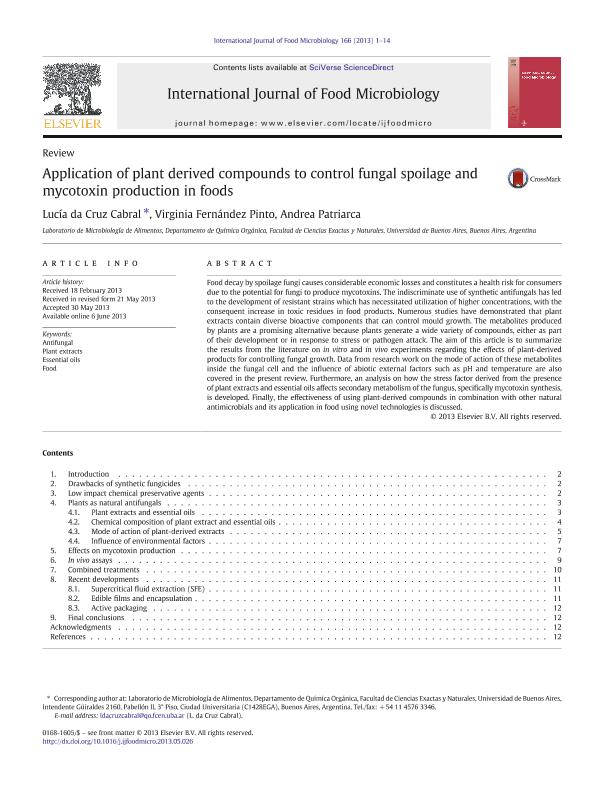Mostrar el registro sencillo del ítem
dc.contributor.author
Da Cruz Cabral, Lucía Mariana

dc.contributor.author
Fernández Pinto, Virginia

dc.contributor.author
Patriarca, Andrea Rosana

dc.date.available
2017-06-28T14:03:41Z
dc.date.issued
2013-06-06
dc.identifier.citation
Da Cruz Cabral, Lucía Mariana; Fernández Pinto, Virginia; Patriarca, Andrea Rosana; Application of plant derived compounds to control fungal spoilage and mycotoxin production in foods; Elsevier Science; International Journal Of Food Microbiology; 166; 1; 6-6-2013; 1-14
dc.identifier.issn
0168-1605
dc.identifier.uri
http://hdl.handle.net/11336/18988
dc.description.abstract
Food decay by spoilage fungi causes considerable economic losses and constitutes a health risk for consumers due to the potential for fungi to produce mycotoxins. The indiscriminate use of synthetic antifungals has led to the development of resistant strains which has necessitated utilization of higher concentrations, with the consequent increase in toxic residues in food products. Numerous studies have demonstrated that plant extracts contain diverse bioactive components that can control mould growth. The metabolites produced by plants are a promising alternative because plants generate a wide variety of compounds, either as part of their development or in response to stress or pathogen attack. The aim of this article is to summarize the results from the literature on in vitro and in vivo experiments regarding the effects of plant-derived products for controlling fungal growth. Data from research work on the mode of action of these metabolites inside the fungal cell and the influence of abiotic external factors such as pH and temperature are also covered in the present review. Furthermore, an analysis on how the stress factor derived from the presence of plant extracts and essential oils affects secondary metabolism of the fungus, specifically mycotoxin synthesis, is developed. Finally, the effectiveness of using plant-derived compounds in combination with other natural antimicrobials and its application in food using novel technologies is discussed.
dc.format
application/pdf
dc.language.iso
eng
dc.publisher
Elsevier Science

dc.rights
info:eu-repo/semantics/openAccess
dc.rights.uri
https://creativecommons.org/licenses/by-nc-sa/2.5/ar/
dc.subject
Antifungals
dc.subject
Plant Extracts
dc.subject
Essential Oils
dc.subject
Food
dc.subject.classification
Alimentos y Bebidas

dc.subject.classification
Otras Ingenierías y Tecnologías

dc.subject.classification
INGENIERÍAS Y TECNOLOGÍAS

dc.title
Application of plant derived compounds to control fungal spoilage and mycotoxin production in foods
dc.type
info:eu-repo/semantics/article
dc.type
info:ar-repo/semantics/artículo
dc.type
info:eu-repo/semantics/publishedVersion
dc.date.updated
2017-06-08T19:36:32Z
dc.journal.volume
166
dc.journal.number
1
dc.journal.pagination
1-14
dc.journal.pais
Países Bajos

dc.journal.ciudad
Amsterdam
dc.description.fil
Fil: Da Cruz Cabral, Lucía Mariana. Universidad de Buenos Aires. Facultad de Ciencias Exactas y Naturales. Departamento de Química Orgánica; Argentina
dc.description.fil
Fil: Fernández Pinto, Virginia. Universidad de Buenos Aires. Facultad de Ciencias Exactas y Naturales. Departamento de Química Orgánica; Argentina
dc.description.fil
Fil: Patriarca, Andrea Rosana. Consejo Nacional de Investigaciones Científicas y Técnicas. Oficina de Coordinación Administrativa Ciudad Universitaria. Instituto de Micología y Botánica. Universidad de Buenos Aires. Facultad de Ciencias Exactas y Naturales. Instituto de Micología y Botánica; Argentina
dc.journal.title
International Journal Of Food Microbiology

dc.relation.alternativeid
info:eu-repo/semantics/altIdentifier/url/http://www.sciencedirect.com/science/article/pii/S0168160513002730
dc.relation.alternativeid
info:eu-repo/semantics/altIdentifier/doi/http://dx.doi.org/10.1016/j.ijfoodmicro.2013.05.026
Archivos asociados
